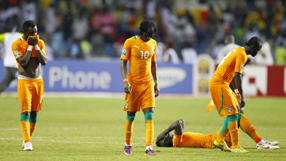
Drobga, 33, has taken part in four Nations Cups and seen his side lose twice on penalties in the final, once in the semi-finals and once in the quarters, despite invariably being billed as favourites and playing some of the best football.
This year's tournament looked to be the last chance for the likes of Drogba, Didier Zokora and Kolo Toure who under normal circumstances would have to wait two years for another crack at the title.
But the Confederation of African Football (CAF) has switched the competition to odd years rather than even so that it no longer takes place in the same season as a World Cup.
Rather than wait three years until the next Nations Cup, CAF has decided to that the competition will be held in 2013, in South Africa.
"If they still have the motivation they can still play an important role for the team," said coach Francois Zahoui, whose own future is the subject of speculation, after they lost on penalties to Zambia in Sunday's final after a goalless draw.
"But these are decisions not to be made now."
Zahoui, determined to end Ivory Coast's habit of playing attractive football but failing to win the trophy, had banked on a more pragmatic approach and his team got through their six games without conceding a goal.
The best features, fun and footballing quizzes, straight to your inbox every week.
But his lacked of ambition cost them in the final against opponents who were always adventurous despite their underdog status.
PROBLEMS AHEAD
While Drogba may have benefited from the switch, other quirks and problems now lie in store.
The qualifying competition for 2013 will have to be greatly curtailed and CAF has decided to play it in a straightforward knockout format, with home and away ties in each round.
This year's 16 finalists will be given byes to the final qualifying round and will be seeded, meaning they only have to play two matches to get to South Africa.
These 16 include Equatorial Guinea and Gabon, who only qualified for 2012 as co-hosts and would not normally be counted among the continent's top sides.
The likes of Nigeria, Cameroon and Egypt, meanwhile, enter the fray one round earlier.
The change also means that CAF will no longer be able to combine the Nations Cup qualifiers with World Cup qualifiers - a ploy which worked well in 2010 and was widely welcomed by European clubs tired of having to release their African players.
Africa's World Cup qualifying format has also changed with 10 groups of four in the main phase of the tournament, which starts in June, followed by play-off ties between the winners to determine the continent's five representatives in Brazil.
This means that not only do teams have to win their group, they must also go through the tension of a two-leg knockout tie to qualify. They will not be able to comfortably qualify with games to spare by dominating the group.
Ivory Coast have a tough start with Morocco in their group, while Nations Cup champions Zambia have fared even worse, having t
 Join The Club
Join The Club





